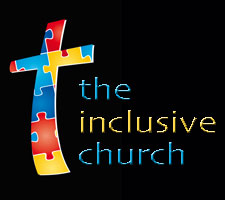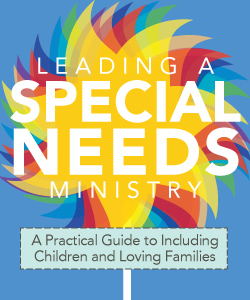Baptizing a Person with a Cognitive Disability
A blog’s reader posted the following question on The Inclusive Church’s Facebook page earlier this week:
“Does anyone have good baptismal liturgy resources for people who will never be able to answer for themselves? Normally when you baptize someone who can’t answer for themselves (say, a baby), the parents or sponsors promise to raise them in the Christian faith until they can answer for themselves. But tomorrow I’m supposed to baptize an elderly woman with dementia. I’m trying to figure out the right questions to ask, and what to leave in and what to keep out.”
To answer this question, I contacted Dr. Gary Fenton, Pastor of Dawson Memorial Baptist Church in Birmingham, AL. Having served as a senior pastor for more than forty years, Dr. Fenton has baptized a number individuals with intellectual impairments and communication differences. Dr. Fenton answered this question from the perspective of a tradition that observes baptism as a symbolic follow-up to a person’s profession of faith. While other traditions may administer baptism (and other rituals) differently, I think Dr. Fenton’s insight can be applied across many denominations and church settings:
“Our church has and does baptize individuals with special needs. The minister baptizing the individual may adjust the language during the Baptism to ensure that the participant can understand the words and phrases they are hearing. However, we are not significantly changing our introduction or the liturgy. In addition, we do not require a public response from the individual during the baptism.
We have learned that the most important thing we can do is to make sure that the minister and the individual participating in the baptism are familiar with each other before the event. Meaningful before-hand conversation ensures the person’s understanding for their baptism. In addition, the preparation builds a sense of familiarity and comfort between the participant and the baptizing minister. Like any new experience or setting, Baptism can be a stressful event for a person with special needs. As a result, when we baptize anyone with a disability, we arrange for a friend or family member to stand in the baptismal water along with the minister. It is in these situations that we are reminded that the relationship is ultimately more important than the ritual.” – Dr. Gary Fenton
Dr. Gary Fenton is the Senior Pastor of Dawson Family of Faith in Birmingham, AL. To read more of Dr. Fenton’s own writing see his Character Path Blog. ~Yes, Dr. Fenton is my father and I’m a very proud daughter!~



A very important post. So often we do not think about our friends receiving the sacraments. Sometimes we need to think through how people will receive sacraments. It’s form verse function. Knowing what a person needs helps for people to have a great experience. In that experience we want our friends to have full access to our Savior. So, if someone is afraid of water or does not want to be touched, we can still baptize someone. In addition, I find having the person visit where they are going to be baptized and going through the elements ahead of time can be helpful!
I think it was a year or 2 ago, when a young lady in our church (maybe 11 or 12 years old then) was baptized. She has cerebral palsy and autism. In our church, we do video testimonies ahead of time. She did great (our pastor over baptism does a great job helping people feel comfortable).
Besides the video, the biggest concern was how she would do being baptized in front of 100’s of people. But her parents and our church staff worked together to help her. They made sure she came in the sanctuary early to see the baptismal pool, and made sure she went first. And they were prepared that if she got nervous last minute, then we would skip over her, and baptize her later after the service was over.
Such a cool moment.
We did a baptism of one of our members with a cognitive disability last Sunday. She could answer questions that where reworked to be concrete and answerable by her and she did. Much time was spent with her and the elder performing the baptism along with his wife. A trusting relationship has been built, and both came to the table equally in community. Dr. Fenton’s reminder that relationship trumps ritual is incredibly wise and can be applied to most of what happens in a church community, especially for people with mental disabilities. I do not believe letting someone else answer for someone is a good idea no matter the circumstance, that would be taking the easy way out.
Finding ways to give everyone access as Laura Lee said, is incredibly important. Access to everything the church does is an everyday process, and I pray we all remember to not wait for someone with a disability to request to be part of what we do. Rather that we proactively make our church families thoroughly accessible in order that all would come. Jesus went to the pools, synagogue entrances, and towns such as Bethany to give people with disabilities access to God, shouldn’t we do what He did?